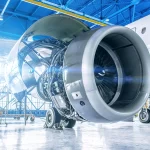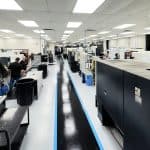An Informational Brief on Polymer Machining
Polycarbonate, one of the oldest known polymers, was first discovered in 1898 by Alfred Einhorn at the University of Munich. It was not until 1953 that Bayer patented the first linear polycarbonate and branded it as “Makrolon”. Ever since then, this material has become one of the most commonly used polymers across multiple industries.
Known for its durability, stability and clarity, polycarbonate is commonly found in car lighting systems, shatter-proof windows and “glass parts” replacement in aerospace applications like military fighter jet canopies, as well as laboratory lenses, heat-loaded plastic parts, electric circuits and other electrical applications. Not only is PC tough with excellent impact strength, it is easily machined, molded and thermoformed.
AIP has over 35 years of experience machining complex components from thermoplastics like polycarbonate. In this insightful technical brief, we will discuss what goes into machining polycarbonate and how it differs from other manufacturing options such as metal machining, injection molding, and 3D printing.
Properties of Polycarbonate
Keeping information about the properties of a thermoplastic beforehand is always beneficial. This helps in selecting the right thermoplastic for an application. It also assists in evaluating if the end use requirement would be fulfilled or not. Here are some of the key properties of polycarbonate:
PC (Polycarbonate) is a transparent amorphous thermoplastic characterized by very high impact strength and a high modulus of elasticity. PC absorbs very little moisture, resists acidic solutions and has a 290°F (145°C) heat deflection temperature at 264 psi.
Additionally, PC has good dielectric strength, UV resistance and is an easily machined material. Compared to Acetal, PC has a higher tensile strength at temperatures over 140°F (60°C), as well a low dissipation factor. PC also has a much higher temperature resistance than acrylic and offers greater impact resistance.
Grades of Polycarbonate
At AIP, we machine various grades and brand name polycarbonates including: LEXAN, HYZOD/MAKROLON, QUADRANT PC 1000, SUSTANAT PC, TECANAT, ZELUX and 20% glass reinforced polycarbonate.
Our close ties with the industry’s leading plastics manufacturers give us even further insight and access to technical help in material selection, sizing and manufacturing procedures. Whatever your application, our machinists can help you in material selection, sizing and manufacturing techniques from concept to completion.
Machining Polycarbonate
Annealing Polycarbonate
Polymers like PC are prone to stress cracking and premature part failure when placed under high heat and tensile load. Therefore, annealing is crucial if you want a quality, precision machined part out of the stock shape. The annealing process at AIP greatly reduces the chances of these stresses occurring from the heat generated during machining PC and other polymers. Our machinists use computer controlled annealing ovens for the highest quality precision machining.
Machining Polycarbonate
Polycarbonate rod and plate are easy to machine and have excellent dimensional stability. We recommend non-aromatic, water-soluble coolants because they are most suitable for ideal surface finishes and close tolerances. These include pressurized air and spray mists. Coolants have the additional benefit of extending tool life as well.
Some companies machine both metals and plastics, which has detrimental outcomes for machined polymer products. Many past experiences have shown parts going to customer without cracks, only to develop surface cracks and warping over time due to exposure to metal machine shop fluids. Be sure to use a facility like AIP that only machines polymers.
Preventing Contamination
Contamination is a serious concern when machining polymer components for technically demanding industries such as aerospace and medical sciences. To ensure the highest level of sanitation down to the sub-molecular level, AIP Precision Machining designs, heat-treats, and machines only plastics with any sub-manufactured metalwork processed outside our facility. This allows us to de-risk the process from metallic cross contamination.
Polycarbonate Machining Guide: Supportive Information
Do you have a question about a precision machined part from polycarbonate or another polymer?






